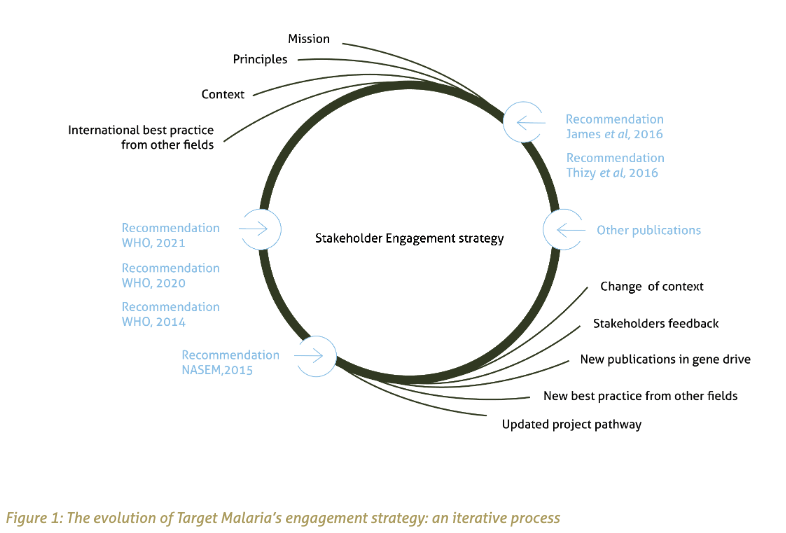Summary: The paper in Malaria Journal synthesises the experiences and outcomes from engagement sessions with communities and stakeholders in Africa since the inception of the research project. This is this the first time that a gene drive research project has mapped its response to every stakeholder engagement recommendation from existing guidelines, and shared detailed case studies on how these were implemented.
London, August 10 2022: A new paper published by Target Malaria’s stakeholder engagement team in Malaria Journal outlines how its stakeholder engagement strategy for gene drive research translates engagement guidance into practice. In detail, the paper, entitled “Operationalizing stakeholder engagement for gene drive research in malaria elimination in Africa—translating guidance into practice”, recounts how, between 2012 and 2020, the project analysed and addressed the tension between context specificities and international recommendations, outlining the key learnings and adaptations that have shaped the operationalization of its stakeholder engagement strategy.
The paper outlines how Target Malaria stakeholder engagement teams in three African countries (Burkina Faso, Mali and Uganda) highlighted three core considerations during the operationalization of their stakeholder engagement strategies; adapting to stakeholders preferences, inclusiveness and empowerment and accountability. The paper provides practical case studies demonstrating how this was done.
Stakeholder engagement activities included:
- The ‘scientific café experience in Mali’, engaging with a popular citizen café tradition in the country;
- Involving the neighbouring communities for the inauguration of the new insectary in Uganda;
- Developing an accountability framework with a committee of community members in Burkina Faso;
- Conducting an ethnographic study in order to understand the power relations between citizens of rural communities to ensure that communities are genuinely represented by their leaders.
While virtually all recent guidance documents on gene drive research stress the importance of stakeholder engagement activities, no specific guidelines on implementing them has been established. This is this the first time that a gene drive research project has mapped its response to every stakeholder engagement recommendation from existing guidelines, and shared detailed case studies on how these were implemented. By sharing its’ practices and learnings in this paper, Target Malaria hopes to offer concrete examples to support other research projects with the development and implementation of engagement strategies.
The paper builds on another publication that articulates the ethical principles that inform this strategy.
Dr. Lea Pare Toe of Target Malaria Burkina Faso, the paper’s first author, said: “The strategy was constantly adapting through an iterative process reflecting the different countries’ contexts, the evolution of international guidance and the promising development of gene drive research. This flexibility has been critical to the strategy’s effectiveness.”

Naima Sykes, co-author of the paper and Target Malaria’s Global Stakeholder Engagement Manager, said: “I hope other projects with significant engagement activities will benefit from these learnings, such as our experience of engaging early and continuously, empowering people through meaningful co-development, adapting to local customs, languages, and cultures and overcoming participant fatigue.”
The engagement described in this paper was not applied to a gene drive field evaluation as there are currently no gene drive mosquitoes in Africa. The strategy described in this paper responds to the early phases of research that will inform the learning and building of a rigorous engagement model for potential gene drive evaluation field releases as part of Target Malaria’s phased pathway. It is a case study of building community and stakeholder partnerships for other vector control research projects to consider.
